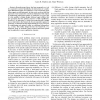31 search results - page 1 / 7 » Overcoming limitations of game-theoretic distributed control |
TSP
2010
12 years 11 months ago
2010
Abstract--The concept of cognitive radio (CR) has recently received great attention from the research community as a promising paradigm to achieve efficient use of the frequency re...
CDC
2009
IEEE
13 years 9 months ago
2009
IEEE
—Recently, game theory has been proposed as a tool for cooperative control. Specifically, the interactions of a multiagent distributed system are modeled as a non-cooperative ga...
CORR
2004
Springer
13 years 4 months ago
2004
Springer
A growing body of literature in networked systems research relies on game theory and mechanism design to model and address the potential lack of cooperation between self-intereste...
ICDCS
2008
IEEE
13 years 11 months ago
2008
IEEE
Software-based usage controls typically are vulnerable to attacks. Trusted Platform Modules (TPMs) can enable much more robust controls. However, as conventionally understood, TPM...
BIRTHDAY
2005
Springer
13 years 10 months ago
2005
Springer
This paper proposes a Compiled Labelled Deductive System, called ACCLDS, for reasoning about role-based access control in distributed systems, which builds upon Massacci’s tablea...

